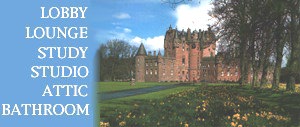Yes folks I'm a mathematitian at heart, and I know right now you're thinking of those open university programmes you used to see before kids TV of a Sunday morning - brown suits, green ties and permed hair that indicates these presenters were either on drugs or needed to be. But if you do get a kick out of solving x in terms of y,d,l and u then maths if definitely your subject.
So what use is Mathematics?
Mathematics is a very, very important subject.
It is a structured language that, once a problem is translated into it, the rules of mathematics can be applied and a solution found.
The most trivial of problems like :
3 apples + 5 apples = ?
is formally solved by :-
- converting the number of apples to integers,
- using the additon law for integers : 3 + 5 = 8,
- so obtaining the answer,
8 apples
Of course we do such simple problems every day without even thinking about the translation, but more complex problems need extra thought to translate and more advanced formulae to solve.
One of the main concepts in mathematics is that of algebra. Yes cringe and grit your teeth, but without it, mathematicians would constantly have writers cramp.
Algebra is basically a shorthand notation, in the same sense as what a sectratary would use - it just allows documents to be written more quickly and so theorys to be proved faster.
For example, in population modelling, we could write : 'population of the world...' in every line of the proof!
Instead, we simply define, at the top of the page : 'P = population of the world'
and from then on simply write 'P'.
An example of this use of algebra is given by the derivation of my lottery rating function.
One of the main problems with algebra is people tend to forget the algebraic definition. It is always vital to know what all these symbols mean. This is the main reason why people think of algebra as pointless and totally useless - once the meaning has been lost, it tends to be difficult to understand.
Even in simple examples, like the apples problem above, the solution must be converted back to real life quantities.
The answer '8' is meaningless. The proper answer is '8 apples'
The reason for mentioning algebra as a basis for mathematics is that mathematics is a 3D subject and it is essential that one has a firm foundation on which to build more complex mathematical arguments.
What do I mean by 3D....
I find that some subjects like History (I appologise to historians in advance), are 2 dimensional - you learn one topic and then move onto the next, never actually using the stuff you learnt until the exam. Where-as maths has a basis, of simple arithmetic, upon which the ideas of higher level techniques are built upon. In a lecture/lesson of maths you never actually learn new topics merely expand on those already known. For each new theory that is learnt, old results and ideas are used. So we are constantly using and revising theorys learnt previously.
But the power and excitment of mathematics can really be put into context by its lifeline.
All of the maths you learn at school and even alot of it here at university, is old - very old.
We all know and love, most of us to hate, Pythagoras's Theorem - How old? Let's just say Jesus might have been taught it!
The MacTutor archives will give a full chronological breakdown of all the great mathematicians and their works.

The Mandelbrot Set
|
The advent of computers has also 'awakened' many paths that were previously thought impossible to investigate.
Around the turn of the century Georg Cantor and Gaston Julia introduced the idea of fractal images produced by numerical iteration and segmentation. At the time work on this was being performed by hand was slow and teidious. However, in 1980 Benoit Mandelbrot brought these ideals back via use of the computer.
You can see how these amazing images, created purely by the nature of numbers, in the fractal gallery site.
This leads you to think of how modern mathematics is so much more advanced. The maths you learnt at school, by no means outdated, but is just the tip of the ice-berg.
I can't remember who said 'For every problem solved, at least two new problems arise' but it is this what keeps maths going.
New 'twigs' of maths are formed on each branch everyday. There is no end to where mathematics will go, or rather, where mathematics will take us.

Some mathematical links 'n' stuff....
Lecturers...
[ Lobby | Lounge | Study | Studio | Attic | Bathroom ]
©1997 Stephen Battey
This page hosted by  Get your own free home page
Get your own free home page



